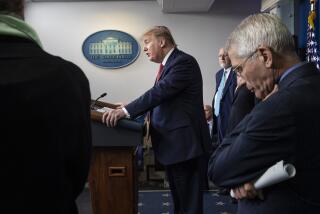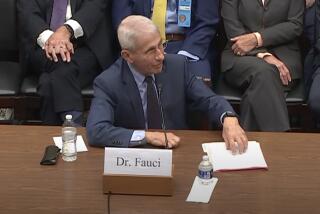Watergate Words Ring During Debate
- Share via
WASHINGTON — It was a day filled with history lessons. Four Democrats cited George Mason, one of the Founding Fathers; three cited Alexander Hamilton, the first Treasury secretary. George Washington, Theodore Roosevelt and Gerald R. Ford also earned mentions.
But hovering most obviously over Monday’s session of the House Judiciary Committee was the ghost of Watergate--a presence that loomed as large as the life-sized portrait of former Rep. Peter W. Rodino Jr. (D-N.J.) that hung high above panel members.
It was Rodino who presided over the very same committee’s impeachment deliberations against Nixon in 1974. And in the rhetorical sparring that set up Monday’s party-line vote to recommend an impeachment inquiry against President Clinton, today’s 37 panel members seemed acutely aware that they will be judged against their predecessors.
Concluding his opening remarks, for instance, Rep. Steven R. Rothman (D-N.J.) recalled Rodino’s cautionary words in 1974: “Our own public trust, our own commitment to the Constitution, is being put to the test.”
Rothman’s words were designed to press the Democratic case that, although Clinton’s actions in the Monica S. Lewinsky scandal may be reprehensible, his alleged offenses--even if proved--do not warrant removal from office.
But Republicans played their own Watergate cards as they argued that no one can be allowed to stand above the law.
Rep. Bob Barr (R-Ga.), one of Clinton’s harshest critics, used the chilling words of Nixon White House lawyer John W. Dean III to characterize Clinton’s conduct.
Accusing the president of abusing his powers, lying to a grand jury and obstructing justice, Barr said Clinton’s actions were “symptoms of a cancer on the American presidency” that must be eradicated.
At least one member wondered whether the historical references made sense.
“Is this Watergate or Peyton Place? I don’t know,” said Rep. Lindsey O. Graham (R-S.C.).
Through it all, Committee Chairman Henry J. Hyde (R-Ill.) ran a tight ship. Repeatedly, he allowed loquacious Republicans and Democrats to exceed their allotted five minutes of speaking time--but only by 15 seconds.
After three unbroken hours of opening statements, it was lunch, not Lewinsky or Clinton, that was on the minds of most members.
As his turn to speak came up, Graham remarked to appreciative laughter: “The good news is, me and Mary Bono stand between lunch, and we’ll try to get through this thing . . . we’re all tired. I am getting hungry, and I want to get on with this. The public wants it over.”
Bono (R-Palm Springs) was equally accommodating--as she injected an extraordinarily personal note into her remarks.
Alluding to the death of her husband, former Rep. Sonny Bono, in a skiing accident in January, she spoke of the “very difficult time for our country . . . and for me personally,” and called for “a healing process to begin.”
Thereupon Hyde quickly slammed down his gavel, heralding an hour’s break for lunch--short by congressional standards--as grateful committee members, staffers and the standing-room-only audience beat a hasty exit from a hearing room baked by television lights.
Only 15 seats were set aside for the public. As the session got under way, three dozen people formed a line outside to await their turn for short stints inside the committee room.
“In 1974, my brother came to the Watergate hearings,” said Dan Sanaghan, a local GOP official from Illinois. “He wasn’t able to be here today, but I thought I’d keep on the family tradition.”
Also in the audience were three White House officials, led by Lanny A. Breuer, special counsel to the president.
After lunch, the committee heard from its Republican and Democratic staff counsels. They predictably disagreed over the course of action.
As the afternoon wore on, the sense of drama and history in the making began to wane. People fidgeted. Some wandered in and out of the room in search of fresh air or something to drink.
The battle for public opinion also was waged outside the committee room. Not far away, in a high-ceilinged alcove with the acoustics of a basketball court, a bank of more than a dozen cameras and microphones stood at the ready--offering emerging committee members one more chance to make another point.
But, of course, that would not be the end of it.
Even as the committee was debating the scope of an impeachment inquiry, members were being booked for the night’s television gabfest.
During one exchange, Rep. Robert Wexler (D-Fla.) told Barr he would respond to him later--when the two of them appeared on CNN’s “Crossfire.”
The day’s opening salvos in the Clinton case had been fired long before that on the morning news shows--the first one airing all of three minutes after the sun rose over a gray and damp nation’s capital.
Each party trotted out articulate spokesmen and women to begin what would be a full day of passionate rhetoric designed to win the hearts and minds of the American people.
Ultimately, just what the public will make of the titanic power struggle is unclear. During the committee hearing, Rep. Howard Coble (R-N.C.) recalled three telephone messages left at his office last week.
“One said . . . if I don’t vote to impeach the president, never to come back home. A second call said if I don’t conclude this hearing today--as if I could do that--she’ll never vote for me again,” he said.
The third caller expressed the hope that Coble “dies a painful death from prostate cancer.”
Barr described the hearing as “Congress at its greatest.” But Coble had a different view.
“Some people came here expecting some of the trappings of the commencement of World War III,” he said. “It didn’t happen.”
Times staff writers Janet Hook, Marc Lacey and Doyle McManus contributed to this story.
More to Read
Get the L.A. Times Politics newsletter
Deeply reported insights into legislation, politics and policy from Sacramento, Washington and beyond. In your inbox twice per week.
You may occasionally receive promotional content from the Los Angeles Times.










